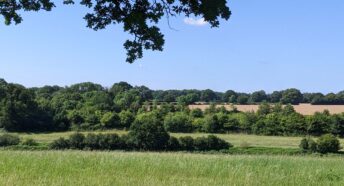'Greenest Budget desperately needed but not delivered'

Today’s Budget (Wednesday, March 3) represents a missed opportunity to help tackle the climate emergency, according to CPRE, the countryside charity.
Responding to Rishi Sunak’s Budget Statement, Crispin Truman, chief executive of CPRE, the countryside charity, said: “The Chancellor’s Budget simply doesn’t add up – the government can’t claim to have a ‘real commitment to green growth’ while using funding models that systematically disadvantage rural communities and worsen the climate emergency” said Mr Truman.
“By levelling up between urban and rural investment, not just north and south, we could regenerate many rural towns and villages that have been long forgotten.
“It’s just not right that government spending per person on public infrastructure is 44 per cent higher for urban areas than it is for rural areas with no major cities. We risk levelling up northern cities to the level of London and leaving rural areas stuck in disadvantage and decline.
“Today, the Chancellor has also missed a golden opportunity to prove that the government really means business when it talks about the UK being a genuine world leader in tackling the climate emergency.
“What we need is for the government to help create green and sustainable jobs up and down the country that help real people, while also making the UK economy greener.
“The Chancellor mentioned ‘green growth’, ‘green industries’ and ‘green projects’ nine times, but there’s nothing green about the jobs created by a new coal mine in Cumbria.
“He should be stimulating jobs in areas like Cumbria with renewable energy and energy efficiency, rather than through a coal mine that will be disastrous for carbon emissions and disastrous for our international reputation on climate in equal measure.
“All in all, a disappointing Budget for climate, communities and the countryside.”
Wednesday, March 3, 2021
- A number of important documents have yet to emerge. For example, a rigorous transport plan and a finalised air-quality assessment. The latter is critical given that allocations at Teynham will feed extra traffic into AQMAs.
- There seems to be no coherent plan for infrastructure delivery – a key component of the plan given the allocations being proposed near the already crowded Junction 7.
- There seems to have been little or no cooperation with neighbouring boroughs or even parish councils within Swale itself.
The removal of a second consultation might have been understandable if this final version of the plan were similar to that being talked about at the beginning of the consultation process. It is, however, radically different in the following ways:
- There has been a major shift in the balance of housing allocations, away from the west of the borough over to the east, especially around the historic town of Faversham. This is a move that raises many concerns.
- A new large allocation, with accompanying A2 bypass, has appeared around Teynham and Lynsted, to which we are objecting.
- Housing allocations in the AONB around Neames Forstal that were judged “unsuitable” by the council’s own officers have now appeared as part of the housing numbers.
- Most of the housing allocations being proposed are on greenfield sites, many of them on Grade 1 agricultural land – a point to which we are strongly objecting.
Concerns about the rush to submit the plan
The haste with which the plan is being prepared is especially worrying given the concentration of housing in Faversham. If the town is to take a large amount of new housing, it is imperative that the policies concerning the area are carefully worked out to preserve, as far as possible, the unique nature of the town. The rush to submit the plan is likely to prove detrimental.
As Swale does not have a five-year land housing supply, it is open to speculative development proposals, many of which would run counter to the ideas contained in the current plan. Some are already appearing. This is a common situation, and one that, doubtless, is a reason behind Swale’s haste.
Our overriding fear, however, is that this emphasis on haste is ultimately going to prove counterproductive. This is because it is our view that the plan, in its current form, is unlikely to pass independent examination. We are urging Swale to listen to and act upon the comments being made about the plan and to return the plan to the council with appropriate modifications before submitting it to the Secretary of State.
Essentially, this means treating the current consultation not as the final one but as the ‘lost’ second consultation.
The consultation ends on Friday 30 April and we strongly urge residents to make their opinions known if they have not already done so.
Further information








